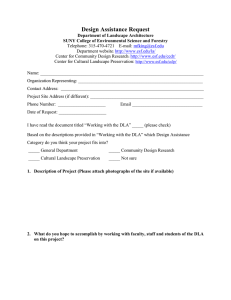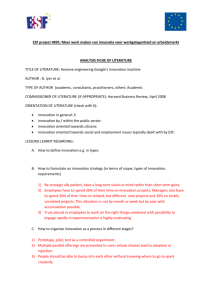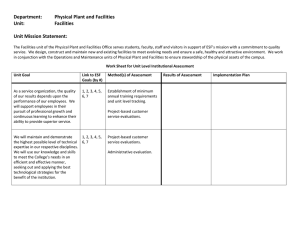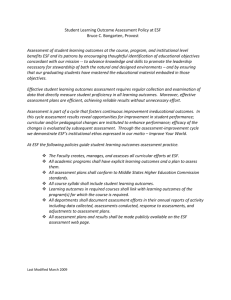ESF Strategic Planning Draft Report on Transdisciplinary Question #1 March 2015
advertisement
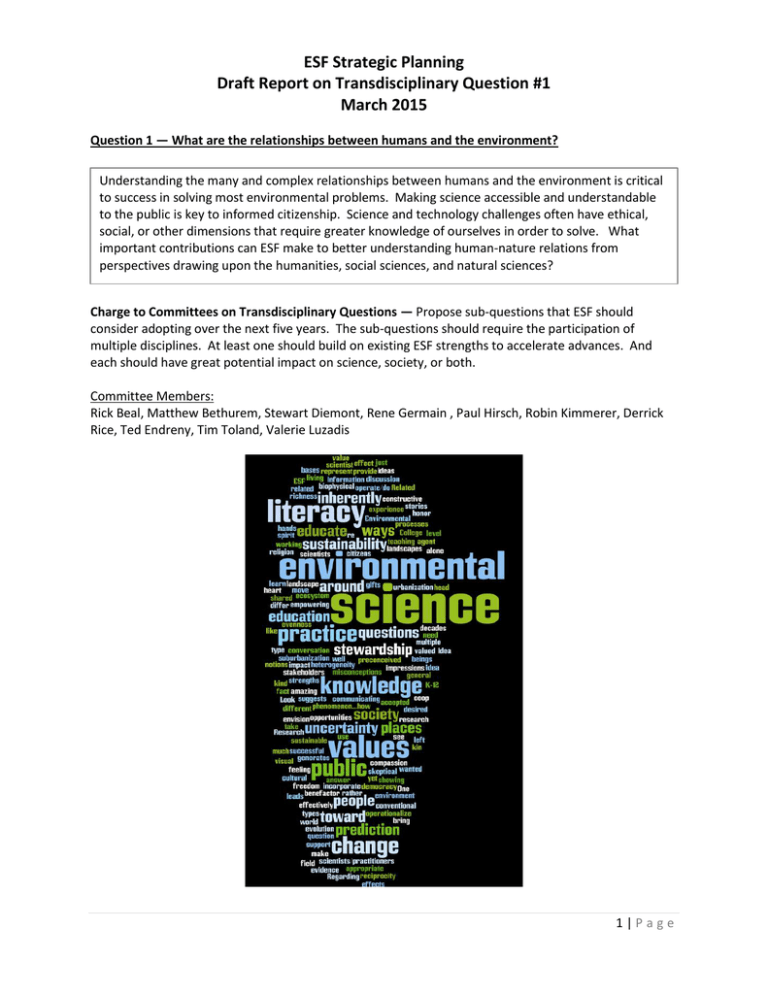
ESF Strategic Planning Draft Report on Transdisciplinary Question #1 March 2015 Question 1 — What are the relationships between humans and the environment? Understanding the many and complex relationships between humans and the environment is critical to success in solving most environmental problems. Making science accessible and understandable to the public is key to informed citizenship. Science and technology challenges often have ethical, social, or other dimensions that require greater knowledge of ourselves in order to solve. What important contributions can ESF make to better understanding human-nature relations from perspectives drawing upon the humanities, social sciences, and natural sciences? Charge to Committees on Transdisciplinary Questions — Propose sub-questions that ESF should consider adopting over the next five years. The sub-questions should require the participation of multiple disciplines. At least one should build on existing ESF strengths to accelerate advances. And each should have great potential impact on science, society, or both. Committee Members: Rick Beal, Matthew Bethurem, Stewart Diemont, Rene Germain , Paul Hirsch, Robin Kimmerer, Derrick Rice, Ted Endreny, Tim Toland, Valerie Luzadis 1|Page What are the roles of environmental values as they relate to managed landscapes and related scholarship? How does the managed landscape become, or is it, a preservation landscape? When is that possible? How might these dichotomies (preservation-managed landscape) be transcended? How do visual impressions of managed landscapes represent preconceived notions of environmental values? What are the differences of perception and knowledge between scientists and others? Does/how does more information change this? If not, what influences environmental values and perceptions? What are the effects of urbanization and suburbanization on environmental literacy and values? What is the role of science literacy in the development and expression of environmental values? What is the role of environment/biodiversity in urbanized society – nature in the city? How do we design and plan for ecosystem services and cultural services? ESF’s strength is the capacity to assess and solve environmental challenges through the lens of a managed landscape in which humans are an integral part. We can manage for conservation or preservation, or any point along the spectrum, but regardless, we are making deliberate and informed decisions on how to best use those ecosystem values and services from our wild (pristine), rural, rural residential, suburban and urban landscapes. We have the talent on this campus to tackle questions of sustainability as they relate to water, biodiversity, forestry, etc. Ultimately, we can help policy makers and managers here and abroad make deliberate and informed decisions on how best to manage natural resources within a framework that respects and protects natural systems while providing valued resources to humans. How do different ways of knowing inform human relationships with nature? What is it that leads to a collective belief that humans are somehow separate from the natural world; that "nature" is something "other" that can be used to our benefit, ignored outright, even imbued with spiritual or "higher" value to people, but is always something apart? What alternative approaches to the way humans live our lives and construct our societies are made possible when we begin to question the veracity and appropriateness of the bedrock of underlying assumptions/practices that shape our values and perspectives? How can the concept of ecosystem services be expanded to be more relevant? Current understanding of ecosystem services is getting more and more tracked to the limited conception that it only refers to benefits to humans. It has the potential to be a much more powerful conceptual model of human-nature interactions than that. Research is showing that decades of conventional environmental education which is largely grounded in communicating biophysical knowledge about the environment has not been successful as a change agent, in empowering citizens to make changes. In fact, evidence suggests it has left people feeling hopeless and powerless. In addition, it may even have set up a hypocrisy of desiring goods and services from nature without an appreciation for managed landscapes. How do we educate holistically-using heart and spirit as well as head and hands in order to support cultural evolution? Education that generates compassion and reciprocity rather than just knowledge alone. Even the outcome of landscape/ecosystem preservation (~hands-off approach) is the product of explicit human choice based upon the weight of certain values being considered greater than the weight of others. Whether you approach something like preservation from a management perspective focused on providing some benefits -- tangible or intangible -- to humans, or whether it is approached via a pathway informed less by what a given landscape can "do" for humans (i.e. a focus on the intrinsic value of the biotic and abiotic components) the outcome itself -- the choice to preserve, for instance -- still is borne 2|Page of a human assessment of a world that is somehow apart from humanity (at least in the powerful nonindigenous-influenced Western paradigm). It begs the question examined by people like William Cronon in his well-known essay on The Trouble with Wilderness. How do we better understand the relationships between personal, cultural, political and environmental values to improve communication, policy development informed by science, and social interaction and organization that supports all life on Earth? What does it mean to be a collection of communities with differing values (American culture)? How to articulate the environment in terms of fundamental notions of values in America? How do we keep ourselves accountable to these values and each other? How to be “in the same book, but not necessarily on the same page”? How to have a constructive conversation when values differ? How do we navigate and negotiate among differing values (transcending dualities)? What are the skills/capacities to be able to negotiate in these ways and spaces? How to honor multiple value bases, freedom of religion, heterogeneity richness and evenness, and move toward sustainability? Can we cultivate the "scientist as storyteller"? ESF has such amazing strengths in field scientists, yet we are not effectively telling/revealing the stories shared with us by the landscape and beings (kin!) Can we envision ways to educate scientists/practitioners to holistically use their human gifts to share the living world with public? What are the different roles of science and the role of science in activism? How to integrate emotions and ethics with the scientific endeavor? This is a potential growth area for ESF, especially as we engage the broader question of the relationships of humans and environment and the relationships of science in policy, advocacy, etc. We currently have relatively little strength in this area. Additional needs to support the pursuit of these questions include either hiring of faculty members and/or partnerships and collaborations that bring expertise in environmental philosophy, humanities and political science. What is the role of language in terms of framing human relationships with nature? How do individual words and rhetoric influence understanding and valuing of nature? How does the framing of environmental policy issues reflect values diversity and influence outcome? o For instance, the language of capitalism, debt, economics is pervasive. How does this influence human relationships with nature? What is the relationship between science and values? How to conduct science in a way that reflects our values when science is supposed to be “value free”? If science is inherently about prediction and society is inherently skeptical about prediction, how do we operate/do science? Handle uncertainty? How do we learn from the application of science in practice in real places to improve the places, knowledge and practice? This represents a possible growth area for ESF given the nature of our scholarship. However we do not have a current focal strength in this area. Further exploration of the possibility of funding research related to such questions is needed. 3|Page
